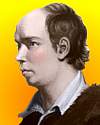 (source)
(source)
|
Oliver Goldsmith
(10 Nov 1730 - 4 Apr 1774)
Irish-English writer and playwright whose literary works include the novel The Vicar of Wakefield (1766) and the play She Stoops to Conquer (1773). His eight volumes of A History of the Earth and Animated Nature (1774) was not a work of scholarship, but used natural history information from others, which he rewrote as popular science reading. The series was reprinted in over twenty editions for decades after his death.
|
Science Quotes by Oliver Goldsmith (12 quotes)
[T]here are depths of thousands of miles which are hidden from our inquiry. The only tidings we have from those unfathomable regions are by means of volcanoes, those burning mountains that seem to discharge their materials from the lowest abysses of the earth.
— Oliver Goldsmith
In History of the Earth and Animated Nature (1774, 1847), Vol. 1, 92.
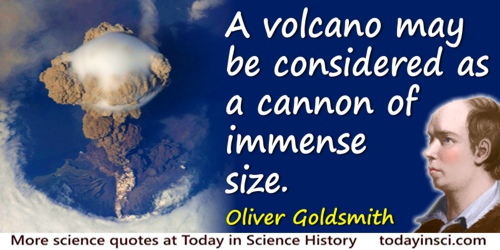
Eruption of Sarychev volcano, Matua Island, Russia, seen from International Space Station (12 Jul 2009) (source)
A volcano may be considered as a cannon of immense size.
— Oliver Goldsmith
In A History of the Earth and Animated Nature (New ed. 1805), Vol. 1, 77.
All the sciences are, in some measure, linked with each other, and before the one is ended, the other begins.
— Oliver Goldsmith
In History of the Earth and Animated Nature (1774, 1847), Vol. 1, 65.
And still they gazed and still the wonder grew,
That one small head could carry all he knew.
That one small head could carry all he knew.
— Oliver Goldsmith
The Deserted Village: A Poem (1809), 11.
As few subjects are more interesting to society, so few have been more frequently written upon than the education of youth.
— Oliver Goldsmith
Essay No. VI, 'On Education', first published in The Bee (10 Nov 1759), collected in The Works of Oliver Goldsmith (1900), Vol. 5, 95. Reprinted as Essay VII under the title 'On the Education of Youth', (1765). The Bee was a weekly paper wholly the work of Goldsmith.
If we look round the world, there seem to be not above six distinct varieties in the human species, each of which is strongly marked, and speaks the kind seldom to have mixed with any other. But there is nothing in the shape, nothing in the faculties, that shows their coming from different originals; and the varieties of climate, of nourishment, and custom, are sufficient to produce every change.
— Oliver Goldsmith
In History of the Earth and Animated Nature (1774, 1812), Vol. 2, 154.
If you were to make little fishes talk, they would talk like whales.
— Oliver Goldsmith
Commenting how the animals in fables should talk in character. As quoted in James Boswell, The Life of Johnson (1785), 229.
Logicians have but ill defined
As rational the human mind;
Reason, they say, belongs to man,
But let them prove it if they can.
As rational the human mind;
Reason, they say, belongs to man,
But let them prove it if they can.
— Oliver Goldsmith
In 'The Logicians Refuted', The Poems and Plays of Oliver Goldsmith (1818), 58.
The world is like a vast sea: mankind like a vessel sailing on its tempestuous bosom. … [T]he sciences serve us for oars.
— Oliver Goldsmith
From concluding paragraph, 'Letters from a Chinese Philosopher', LXXXIII, first published in journal The Public Ledger collected in The Miscellaneous Works of Oliver Goldsmith (1762, 1809), 41.
We may affirm of Mr. Buffon, that which has been said of the chemists of old; though he may have failed in attaining his principal aim, of establishing a theory, yet he has brought together such a multitude of facts relative to the history of the earth, and the nature of its fossil productions, that curiosity finds ample compensation, even while it feels the want of conviction.
— Oliver Goldsmith
In History of the Earth and Animated Nature (1774, 1847), Vol. 1, 73.
Whatever the skill of any country may be in the sciences, it is from its excellence in polite learning alone that it must expect a character from posterity.
— Oliver Goldsmith
Essays, on Miscellaneous Subjects (1818), 198.
When we take a slight survey of the surface of our globe a thousand objects offer themselves which, though long known, yet still demand our curiosity.
— Oliver Goldsmith
In History of the Earth and Animated Nature (1774, 1847), Vol. 1, 67.
Quotes by others about Oliver Goldsmith (2)
Goldsmith: If you put a tub full of blood into a stable, the horses are like to go mad.
Johnson: I doubt that.
Goldsmith: Nay, sir, it is a fact well authenticated.
Thrale: You had better prove it before you put it into your book on natural history. You may do it in my stable if you will.
Johnson: Nay, sir, I would not have him prove it. If he is content to take his information from others, he may get through his book with little trouble, and without much endangering his reputation. But if he makes experiments for so comprehensive a book as his, there would be no end to them; his erroneous assertions would then fall upon himself: and he might be blamed for not having made experiments as to every particular.
Johnson: I doubt that.
Goldsmith: Nay, sir, it is a fact well authenticated.
Thrale: You had better prove it before you put it into your book on natural history. You may do it in my stable if you will.
Johnson: Nay, sir, I would not have him prove it. If he is content to take his information from others, he may get through his book with little trouble, and without much endangering his reputation. But if he makes experiments for so comprehensive a book as his, there would be no end to them; his erroneous assertions would then fall upon himself: and he might be blamed for not having made experiments as to every particular.
In James Boswell, The Life of Samuel Johnson, LL.D.: Comprehending an Account of His Studies and Numerous Works (1785, 1830), 229-230.
The world is a museum in which all men are destined to be employed and amused, and they cannot be too much interested in the objects around them. Goldsmith the elegant imitator of Buffon, says “The mere uninformed spectator passes on in gloomy solitude; while the naturalist in every plant, in every insect, and in every pebble, finds something to entertain his curiosity and excite his speculation.”
From Introduction to a Course of Lectures on Natural History: Delivered in the University of Pennsylvania, Nov. 16, 1799 (1800), 19.
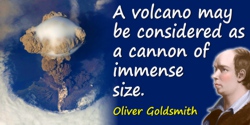
Eruption of Sarychev volcano, Matua Island, Russia, seen from International Space Station (12 Jul 2009) (source)
See also:
- Oliver Goldsmith - context of “Mankind like a vessel on tempestuous sea…Sciences serve us for oars” quote - with medium image (500 x 350 px)
- Oliver Goldsmith - context of “Mankind like a vessel on tempestuous sea…Sciences serve us for oars” quote - with large image (800 x 600 px)

![Oliver Goldsmith quote: [T]here are depths of thousands of miles which are hidden from our inquiry. The only tidings we have fro](https://todayinsci.com/G/Goldsmith_Oliver/GoldsmithOliver-Depths500x250px.jpg)
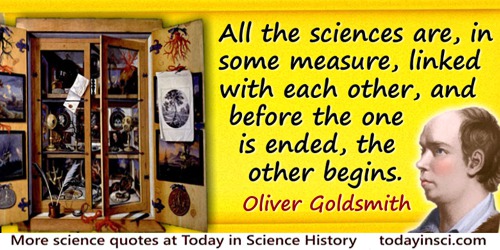
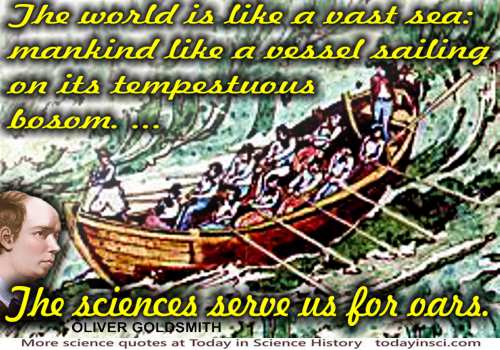

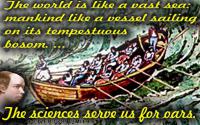
 In science it often happens that scientists say, 'You know that's a really good argument; my position is mistaken,' and then they would actually change their minds and you never hear that old view from them again. They really do it. It doesn't happen as often as it should, because scientists are human and change is sometimes painful. But it happens every day. I cannot recall the last time something like that happened in politics or religion.
(1987) --
In science it often happens that scientists say, 'You know that's a really good argument; my position is mistaken,' and then they would actually change their minds and you never hear that old view from them again. They really do it. It doesn't happen as often as it should, because scientists are human and change is sometimes painful. But it happens every day. I cannot recall the last time something like that happened in politics or religion.
(1987) -- 


